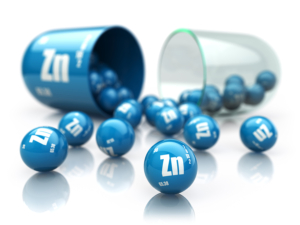Immunity Series: Zinc
What is it?
Zinc is an essential mineral necessary for normal cell development, oxygen transport and storage in our bodies, and assists the mechanisms of several antioxidant enzymes.
Zinc is also an important component of the immune function for certain proteins and enzymes. For example, superoxide dsmutase is a zinc-containing enzyme that protects immune cells from reactive oxygen species that work to kill invading pathogens during an immune response.
What does Zinc do?
Zinc supports normal growth and development in pregnancy, childhood and adolescence. It is necessary for a fully functional sense of taste and smell. Zinc helps to maintain the structure of skin and supports wound healing.
Zinc has been researched and found to help reduce the duration and severity of the common cold by blocking the binding of rhinovirus (a form of virus known for causing the common cold) in your nose and constraining inflammation.
Research has also demonstrated that Zinc delays the progression of vision loss and age-related macular degeneration by protecting against cellular damage in the retina.
For athletes, Zinc has been known to improve bone health, strengthen the immune system and suppress inflammation, as well as, increasing their VO2 max, or the amount of oxygen the body supplies to the muscles.
What foods contain Zinc?
- Oysters
- Crab
- Beef
- Pork
- Chickpeas
- Black Beans
- Dark meat chicken
- Yogurt
- Swiss cheese
- Oatmeal
- Low-fat/non-fat milk
- Peas
Should I supplement and how much should I take?
A daily intake of zinc is necessary to maintain a supply in the body because there is no specialized zinc storage system.
The recommended daily intake of Zinc for adults is 11mg for males and 8mg for females. Infants, children and adults in the US generally consume the recommended intakes of Zinc, but older adults may be at risk for marginal intake.
Zinc is highly bioavailable in meat, so vegetarians may also be at risk for consuming less than the recommended amount of zinc.
Athletes should pay special attention to their zinc levels as zinc is essential for healthy cell division and tissue repair after exercise.
Zinc deficiency may be accompanied with growth faltering, loss of appetite and immune system impairment.
Zinc supplements are present in various forms, including zinc gluconate, zinc sulfate and zinc acetate. Research has not shown cause for difference in bioavailability and absorption between these forms, but the percentage of elemental zinc in the supplement varies. The percentage of zinc in a specific supplement will be found on the Supplement Facts label.
Many studies have identified the benefits of zinc administered through a lozenge or cough syrup when treating the common cold. These forms allow the zinc to better “stick” in the mouth and throat and make direct contact with the rhinovirus.
How safe is it?
Zinc is generally safe to supplement, although most people consume enough zinc through a varied diet. Oral zinc supplements may be beneficial to those who are experiencing low levels of zinc or may be taken to help treat the common cold. Some side effects of zinc oral supplementation may include indigestion, diarrhea, nausea, headache or vomiting.
Bottom Line:
Zinc is essential for multiple body functions. Following a healthy varied diet will most likely supply your body with enough zinc to support immunity. Vegetarians or anyone who is not consuming enough protein should consider consulting with a healthcare provider to ensure accurate micronutrient consumption.
Want to learn more about your individual micronutrient status and nutrition needs?
Check out our nutrition programs here.
References:
https://lpi.oregonstate.edu/mic/health-disease/immunity-in-brief
https://ods.od.nih.gov/factsheets/Zinc-HealthProfessional/#h3




